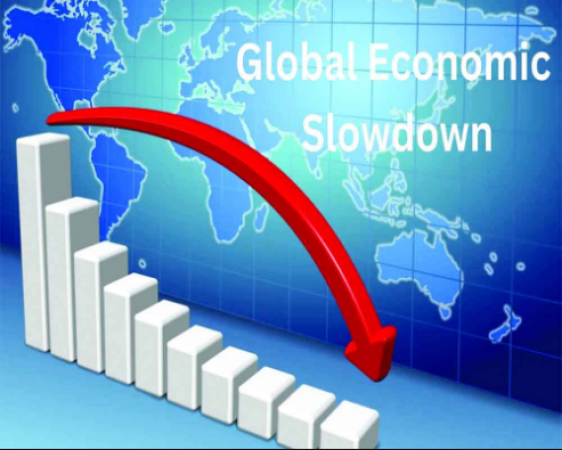
USA: The year 2023 looks set to be another challenging one as high inflation rates, reduced oil and gas supplies, broken supply chains, labor strikes and interest rate hikes by central banks continue to impact global trade markets. There is a possibility turndown of Global Economy.
Global consumption will slow, more households will struggle to pay for essentials, energy prices will continue to rise, and food insecurity will become a bigger issue everywhere.
In the face of the resulting difficulties, the prospect of an unprecedented global economic rebound appears waning. Inflation is causing increasing social unrest around the world and will result in an unstable labor market.
Also Read: Here are some factors that could cause a global recession in 2023
In the year ahead, it is likely that labor strikes will become more frequent and disrupt vital links in global supply chains, logistics services and transportation.
The ongoing conflict between Ukraine and Russia will also slow world gross domestic product (GDP) growth, which the International Monetary Fund (IMF) expects to fall to 2.7% in 2023, 3.2% in 2022 and 3.2% in 2021. was 6.8%.
The IMF issued a warning in October last year, predicting that the global economy would contract by more than a third and there was a 25% chance that global GDP would grow by less than 2% next year, which it described as a global defines in Recession.
With respect to their respective labor markets, the economies of the United States and Europe remain strong. They have experienced historically low rates of unemployment. But overall corporate earnings have declined, and that trend is accelerating.
Businesses face a variety of challenges, including high inflation rates, which are around 8% in the United States and over 10% in the United Kingdom.
As a result of rising supply costs, which force businesses to pay more, and as central banks raise interest rates to raise borrowing costs, businesses' profit margins are shrinking.
Also Read: In 2023 world economy is about to enter a decade of slow growth
The US Federal Reserve extended its benchmark rate to 4.5 per cent through December 2022; However, some Fed policymakers have indicated that the rate will reach 5.25 percent by the end of 2023, despite the fact that the U.S. The Fed chairman said he would keep raising rates until 2023.
As a result, many employers will face significant challenges as more workers demand higher wages to accommodate the prolonged high inflation period.
If workers are struggling to pay for food, housing, transportation and basic necessities, they will seek higher wages or seek more lucrative employment elsewhere.
But if businesses accept higher labor costs, this will increase their operating expenses, which will push up consumer prices even more. The middle class and salaried workers will suffer from the vicious cycle of high inflation and high labor wages. Due to not having much money in the pocket, they are forced to bear the burden of rising expenses.
Stagflation, where the rate of inflation exceeds the rate of GDP growth, is the problem. That's why the general public does not get the benefit of economic development. However, those who are having trouble making ends meet have no choice but to press for higher wages from their employers.
According to reports from UK-based media, thousands of people faced travel delays on Boxing Day (a British holiday) as there was a rail strike that stopped services from running. Many people were forced to change their plans or cancel their travel altogether.
However, Network Rail reported that due to a strike by workers in the Rail, Maritime and Transport union, Britain's railways closed for the second straight day (RMT).
RMTs, train operators and Network Rail have been in dispute for some time over pay, employment opportunities and working conditions. Thousands of Network Rail RMT workers went on strike from 6pm on Christmas Eve. From 27 December till 6 am
In the UK, there are labor strikes other than the RMT. Earlier this month, a large number of nurses employed by the NHS (National Health Service) went on strike to protest against unfair pay and poor working conditions.
China's economy could see a sudden rebound despite a gloomy global economic outlook for the coming year as the nation finally abandons the "dynamic zero COVID-19" policy and focuses more on economic growth.
Also Read: Recession predictions for the world's economy are unfounded
At the annual Central Economic Work Conference in Beijing on December 15-16, Chinese leaders chose the top priorities for the economy's work in 2023, Xinhua reported.
According to the meeting, China will accelerate the development of a contemporary industrial system. In order to make the industrial system independent, controllable, safe and reliable, the meeting decided that efforts would be made to identify key and core technologies as well as weak links in components and parts in the country's major manufacturing industrial chains.